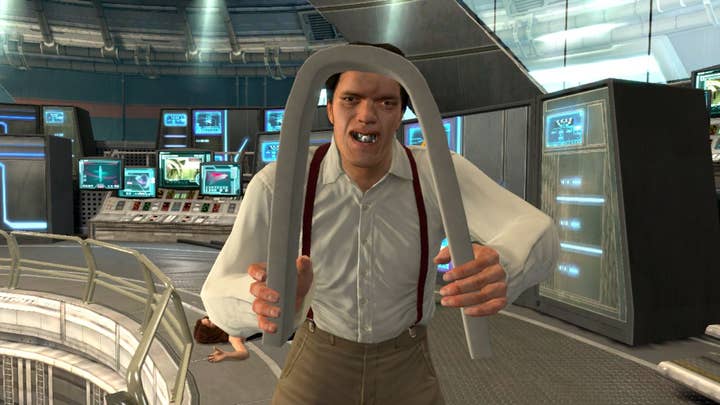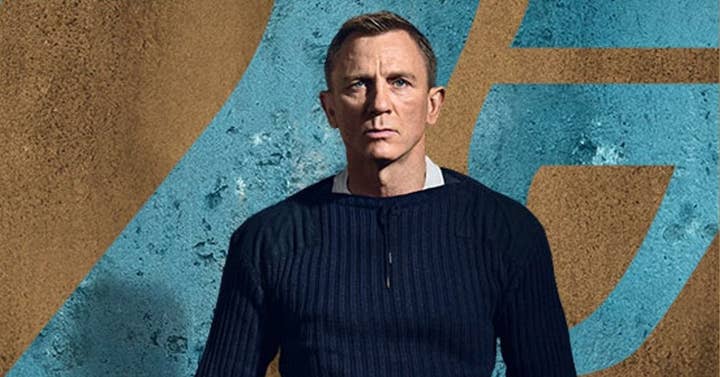Why are there no James Bond games?
In the absence of new film No Time To Die, we explore 007's ongoing absence from video games and the challenge of developing with a licence
The arrival of Xbox Series X|S and PlayStation 5 has many implications for the video games industry. Perhaps the most important but less-discussed one is this: a whole console generation has passed by without a James Bond game.
Ian Fleming's world-famous secret agent last graced consoles in the 2012 shooter 007 Legends, released to coincide with Skyfall and the movie franchise's 50th anniversary. 2015's Spectre was accompanied by Glu's 007 World of Espionage, a free-to-play mobile affair that lasted 18 months -- a game you've almost certainly forgotten.
Bond's next cinematic outing, No Time To Die, was supposed to arrive in cinemas today, having already been delayed from April -- but, y'know, 2020. Despite how long the film has been in production, there has been no word on an interactive adventure for 007 -- whether an adaptation of the new film or a standalone game to sit alongside it -- and there's no reason to believe one will be announced any time soon.
Yet Bond is big money in Hollywood, with the Daniel Craig outings generating considerably more at the box office than the Pierce Brosnan of the '90s and early 2000s. In fact, Skyfall was the first film in the series to pass $1 billion globally. With the rights holders behind properties like Star Wars, Marvel, Harry Potter, Jurassic Park, Jumanji, and even Fast and the Furious all partnering with games firms, why is 007 still missing in action?
During our Changing Channels conference earlier this year, we discussed this very topic, also exploring the changes in how licensed games are handled in general.
"Movie property holders, particularly on the Bond side, are very careful to make a Bond experience that actually is Bond," said Guha Bala, co-founder of Velan Studios and previously co-founder of Vicarious Visions, which developed numerous licensed games for Activision.

"The same thing is true of any of the Harry Potter games, they're very careful to keep the core elements of what makes that narrative or IP great. On the games side we have to be very mindful of that as well. Come up with a core interactivity first and see if there's a fit with something, or should be its own thing."
Keely Brenner, currently working at MWM Interactive but previously of Disney Interactive Studios added that -- contrary to how it may appear -- IP holders are often against doing a quick cash grab, instead seeking the right opportunity.
"You have to ensure you stay true to the brand," she said. "Stay true to your brand bible, and your fans will follow. Because they will tell you if you're wrong. There's a massive community out there [behind each IP] and you do not want to mess with them. You want to make sure they're advocates and mouthpieces for the brand. You want to make something for them that they are proud of and you are proud of. It's all about the quality of the game."
This might speak to EON Productions' reluctance to licence Bond to games firms again. 007 Legends' Metacritic score ranges from 26 to 45, a sharp drop from the 60-70 scores enjoyed by 007 Blood Stone and Goldeneye 007 Reloaded just a few years before (81 for the Wii version of Goldeneye that Reloaded was built from).
There's also a resilience among games firms from being treated as the Hot New Thing, a popular trend that Hollywood hopes to cash in on. Adam Foshko, who worked as Activision's director of story development during its Bond years, recalled that the launch of Heavy Rain prompted several film producers to seek licensed games that essentially replicated Quantic Dream's success.
"It's more about 'How does Bond get out of a situation?' rather than 'Can Bond shoot a guy in the face?' "
Adam Foshko, formerly Activision
But there's a crucial difference they would miss, Brenner added: "Sometimes they forget that although there's a massive crossover of audiences, you're still a passive bystander when you're watching a film. Games are cognitive, you're interacting and you get under the hood of it. Sometimes that's where the film guys are blinkered."
Bala agreed: "The reason for that is what makes linear great is different from what makes interactive great. Interactive is about agency, putting you in the middle of the action, not having a crafted experience... And that's one of the reasons there's very few good movies from video games IP."
The difference between a great film and a great game is crucial here. While the Bond films may seem like an obvious fit for a first-person shooter -- a perception driven in no small part by the success of the iconic Goldeneye 64 -- each film probably spends as much time focused on chase sequences, fistfights or simple conversations between characters. Certainly the Craig films have leaned into drama more than the action-packed films of Brosnan and those before him.
Bala observed that Bond is not the only franchise this applies to. The Walking Dead, for example, was far more suited to the narrative formula of Telltale's adventure games than it was to generic zombie shooters.

He added another example from his previous studio: "If we look at the Spider-Man movies, they were always a story about a boy and a girl. They weren't about endless missions roaming around in a city, they weren't about going through all these narrative beats, mostly with action but with a little bit of story.
"Crazy pitches like a James Bond VR, that gets people excited on the executive side, but it's not what the fans are looking for"
Jason VanDeWalle, Mega Cat Studios
"So what would make a great Spider-Man game is different to what makes a great Spider-Man movie. We saw that came into its own with Insomniac's game. The two mediums can intersect but they don't often do so in a way that makes linear excel and interactive excel."
Another major hurdle in bringing silver screen heroes to video games is the time constraints. Foshko observed that, while the likes of Call of Duty are under constant development on a three-year cycle between multiple studios, licensed games projects often face a "standing start." As he puts it, "it's like shooting a film where you're building the camera from scratch every time."
"When you get a deal to make a game based on a film, you have a very set amount of time, so you have to find a developer who has an engine," he added. "When you get a Bond or any kind of licence, you have to move very rapidly, and very often you [don't have time] to find that core experience and build that out. That's why standalone titles in an IP that are not day-and-date with a film are probably better, as you have the opportunity to really examine it."
Prime examples are the aforementioned Insomniac-developed Spider-Man games and Rocksteady's Batman: Arkham series, which were free from the pressure of fitting with a film's schedule, unlike 007 Legends. Also, any changes to that schedule can also have a far more dramatic impact on the game than they can on the film.
"If you're making a Bond game and you get a script change in the middle, you're like: 'Oh shit, what are we going to do?'" said Bala. "You've got to rework all these levels, make all these changes -- you're optimising for something completely different."

Brenner added: "I remember being on a game where a character was cut and they didn't even tell us until three months down the line."
Again, it comes back to thinking about what people want to experience from each franchise -- not necessarily specific moments, but the general interactions at the heart of the character and the world. More importantly, Foshko said, both developers and rights holders should be striving for something that pushes the boundaries of the IP rather than just imitates it.
"You have to think: 'They couldn't do this in a film' but we have the opportunity with however many hours of gameplay to expand on that and really make it a broader, more interesting experience over time," he said. "That gets the IP holders excited, because there's stuff they couldn't do because of time or money or both.
"People are spending a good deal more time in a game, playing and engaging with the character, the world and the fabric of an IP, than they will actually watching the film -- even if they watch it again and again. So it's critically important to get that level of trust, but also the understanding to get the devs and the publisher to be on the same page with the IP holder."
Bond drifting away from games is in part due to games drifting away from licensed properties. Guha Bala observed that most of the day-and-date game tie-ins we think of were released at a time when games were solely reliant on retail distribution, when customers may not have known what they wanted to buy until they were in the store. Or gifters seeking something appropriate for a friend or child. To these, and the gamers simply browsing, a licence gave a game a lot of name recognition.
But as digital distribution has developed, as more people have begun buying games for themselves, and as the general quality of games has increased, name recognition has become less important. Of more importance is quality and, again, that's hard to achieve when working on such a tight schedule.

For licence holders, it has become far easier to tie in with free-to-play mobile games, which reach a far broader audience than consoles and PC, or to do a partnership with an established game. Just look at the ongoing Marvel event in Fortnite, almost certainly reaching more fans than any of the film adaptations we saw during phase one of the Infinity Saga -- and significantly more than Square Enix's recent release.
Could James Bond's future in games be in cameo appearances then, perhaps as a seasonal guest in a battle royale? Our panel was sceptical.
"Stay true to your brand bible, and your fans will follow. Because they will tell you if you're wrong and you do not want to mess with them"
Keely Brenner, MWM Interactive
"Bond is unique because the IP holders have a very particular view on Bond as a character and how he should be used," Foshko said. "Having worked with them, it's more about: 'How does Bond get out of a situation?' rather than: 'Can Bond shoot a guy in the face?' It comes down to the goals and things that are unique and special about Bond in particular -- even though people would like to play Bond in a situation.
"Preserving him as a character and having him show up in something else might be closer to it. Somehow I think him just appearing as a persona or guest star in a particular kind of experience is the kind of deal that could be done quicker than the other. "
Bala added: "I would like to be Bond in a narrative experience, personally. I have a friend who's a Navy SEAL who told me if you're in a big gunfight, you probably didn't do your job right because you want to get in and get out without being detected. Bond's not a guy that's going to be in a mass battle, that's just a mismatch with the IP. "
But Jason VanDeWalle of Mega Cat Studios, who previously spent 13 years at Nickelodeon handling licensed games, observed that Bond's long absence from games puts more pressure on any potential return.
"If you've gone ten or so years without the brand having an awesome game, then it becomes pretty weird to launch something that's a total twist on a genre or innovative to the point of what the heck of this," he said. "Trying to stay to what people expect out of that brand and doing a flagship game is top priority [in that case]."
He pointed to the success of Batman Arkham VR, an experience that was well-received but due primarily to the reputation for the previous Arkham games. Had it launched as a VR product first, it would have been viewed as DC Comics simply chasing a trend.
"Crazy pitches like a James Bond VR, that gets people excited on the executive side, but it's not what the fans are looking for," he added.
Foshko concluded: "If it's not something that feels like it's going to advance the brand, that doesn't just feel genuine but also makes some strides and actually needs to be a little bit different, needs to stand out -- [if it's not those things], you probably shouldn't do it."
As the films' credits always note, James Bond will return. But let's not hold our breath, eh?










